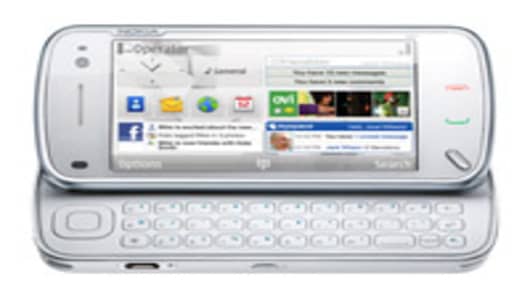Nokia's shares extended their fall Wednesday after issuing a second profit warning the previous day that sent its shares tumbling 18 percent.
The profit warning also led analysts to predict Nokia’s days as the largest mobile phone company in the world could be numbered, with one suggesting its market share could be cut to just 15 percent by the time it launches its Microsoft Windows 7 smartphone.
It has, by Nokia’s own admission, been a tough couple of years. The company may still be the big beast of the mobile phone industry but it has seen its market share plummet over the last twelve months as rivals HTC, Apple and Google have brought out more exciting and more reliable products.
In April, Nokia saw rival HTC overtake it in terms of market value – HTC was valued at $53.8 billion compared to the Finnish firm’s $53.6 billion.
The mobile phone manufacturer said on Tuesday it expected net sales from its devices and services business in the second quarter to be "substantially below" its previous forecast of between 6.1 billion euros ($8.7 billion) and 6.6 billion citing weaker than expected margins and sales.
Its profit warning caused Morningstar to publish a research note in which it cut its fair value estimate for Nokia to $13 from $15 reversing the increase to $15 from $13 that it had made after the company announced first quarter results.
“Our expectation is now for revenue to contract by 3 percent in 2011, rather than increase by 3 percent as per our prior model. We also think that gross margins are likely to contract a bit more than we expected on the shift toward lower-model phones, and on the margin deterioration across the entire product portfolio," Morningstar wrote.
'Burning Platform'
It added that it was clear the Symbian operating system was falling more quickly than expected, making Nokia’s end-of-year launch of its Windows phone line even more critical than it appeared when the transition was announced during the first quarter.
While the firm said it was keeping faith with its own operating systems Symbian and MeeGo and that they would continue for some years to come, by the end of April it had outsourced Symbian development and some 3,000 staff to Accenture. Nokia was also forced to admit it would be shedding a further 4,000 jobs in Finland, the UK and Denmark from the beginning of 2012.
Nokia’s chief executive Stephen Elop warned in February the company stood on a “burning platform” before going on to quote Winston Churchill’s “this is not the end” war time speech.
But Nokia's shares are down 44 percent over the last 12 months and analysts are beginning to wonder whether it is actually the end for the company.
Jochen Wermuth, chief investment office and managing partner of Wermuth Asset Management told CNBC.com Nokia was “a hardware company in a software world”.
“We were looking at the Russian market, for example, and seeing how Nokia were producing stupid phones while the rest of the world was producing smarkphones, so we have been enjoying this as a great short versus some of the other opportunities that we are long on in the world,” he said.
Wermuth added while Nokia started out very well to become grow into global dominance of the mobile phone market, even producing the world’s first smartphone, it was essentially caught napping by Apple and its development of the iPhone.
“They fell behind the curve big time. Can they survive or not? I don’t know," he said.
"In some sense if you were teaming up with the world’s best software provider, if they were doing a deal with Google for its Android software, then it might be different. But Microsoft is just the wrong partner it’s too big of an elephant to manage. So we’re not very bullish on it at all.”
The Stakes Are Huge
Meanwhile, analysts from CCS Insight said the news showed “the severity of Nokia's situation in multiple segments and markets".
Nokia must launch a dual-sim device for the emerging markets and a high-end Windows smartphone to "swiftly to prop up its ailing low- and high-tier portfolios," according to CCS Insight.
And Richard Holway, chairman of Techmarketview.com, said while he was actually quite positive about Nokia’s partnership with Microsoft in terms of the effect it would have on the software giant, it would be “pretty disastrous for Nokia.”
“It was difficult to understand why anyone would buy a Nokia smartphone in the meanwhile. So why Nokia didn’t fully expect its market share to plummet is a bit beyond me,” he said.
Holway added the stakes in the mobile operating system were now huge. He said at the moment there were two "operating system" worlds – the PC/Laptop operating system and the smartphone operating system – but that the smartphone operating system would be the one to prevail as it would be the operating system of choice for tablet computers initially and then laptop and desktops.
“There really are now only two smartphone operating systems in contention – Apple and Android, Even Research in Motion (makers of the Blackberry) is now a distant also ran," he said.
"Microsoft’s very existence depends on getting its mobile operating system established. Nokia is its route to market. But, by the time we get a Microsoft powered Nokia smartphone, its market share might have slumped to 15 percent also ran status too,” he added.
Nokia CEO Stephen Elop joins CNBC live on Wednesday at 3:15 pm ET.


